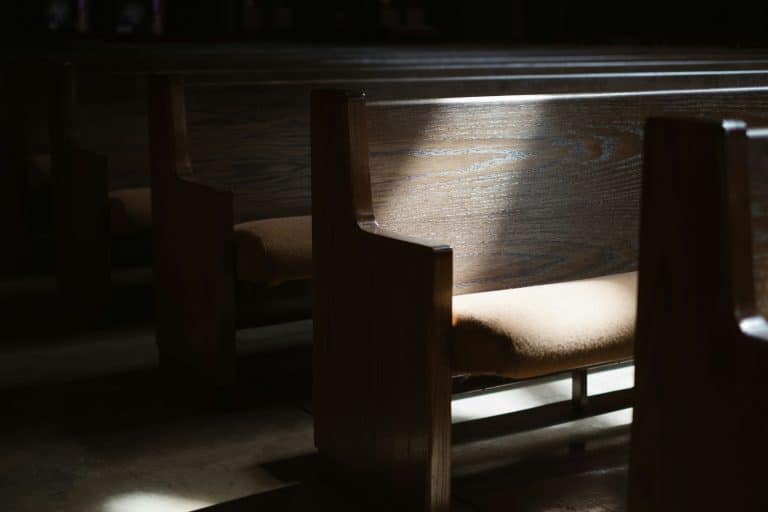It’s ward conference, so nondescript men in black coats and white shirts fill the stand. One of them reads aloud, name after initial after name. We’re just supposed to raise our hands. It’s run of the mill. Hardly worth thinking about.
I am sitting at the back of the stand, one of only two women (both of whom are there to do music related callings). The rote, banal list of leaders and the question that follows hardly register anymore.
But I don’t raise my hand. My body seizes. My heart races. I’ve only done this a million times, but…I can’t. I can’t. I’m…not?
My arm stays down. I neither sustain nor dissent.
My body is frozen. My brain is racing. What did I just do? Did anyone notice? Will someone say something? What is the potential social fallout of my spontaneous action? Will someone think this was premeditated? What am I doing here?
Still the man with the authority at the stand, whose name I do not know, is reading more initials, more titles, but it is not until local leadership that I can move to raise my hand. My body and brain are once again aligned.
This happened once before, at one of those early stadium tour engagements from President Nelson. It’s traditional to stand when the Prophet arrives, and I have stood for any number of General Authorities in the past, but in that moment, my body said no.
My sister, sitting next to me, stood up, noticed me sitting, and prompted me.
“The prophet has arrived.”
I stayed in my chair. I just stayed. Why couldn’t I just stand like everyone else?
I have to trust that my body knows what is harmful to me. That it would be harmful to sustain leaders whose actions I do not condone. That it would be harmful to me to pretend that I do.
At the same time, I don’t feel a call to raise my hand in dissent. Not yet anyway, not in these perfunctory rituals of ours. Absent a meaningful process for registering and addressing dissent, it’s all symbolic anyway.
So, I neither dissent nor sustain. I cannot, with integrity, do anything but sit in this middle space that is neither all nor nothing. I do not raise my hand.
Photo by Josh Applegate on Unsplash






10 Responses
Beautifully written. I totally relate. There are many times where I have not raised my hand — not necessarily because I dislike or don’t support the people whose names are called out — but because the process seems flawed. In my mind, this ritual is not a meaningful way to give feedback. Until people feel free to raise their hand in dissent and have that dissent mean something, this ritual of sustaining feels a bit empty to me.
Well said Caroline. I have wondered if a premeditated lack of voting is, in itself, a meaningful sort of protest of the flaws of the system. It’s not a meaningful way of showing support or voicing concerns for the individual people we sustain.
Yes and yes. The generally accepted language doesn’t say, “Anyone opposed sit down and shut up,” but that IS exactly how we do it.
Standing when the prophet arrives. . . good night. Do they honestly believe the Savior would approve of that?
I stopped raising my hand sometime last year. I just didn’t see the point. The church isn’t a democracy. There is no common consent. The bishop and other priesthood leaders choose the people in the callings. I get no say, except over my own acceptance of a calling. So why pretend? Maybe it’s a protest deep down. But the explanation I gave myself was more self care – cutting out the stuff that doesn’t matter. Putting aside the reminders of my powerlessness in this system. Taking back some power – I don’t have to raise my hand to show I get the system, that I can behave. (Okay, so maybe it is a bit of a protest!)
Lizzie, I am feeling this in my soul. My own faith evolution journey has been very much about eliminating what is harmful and focusing on what is beneficial. Self care and protest!
Yes! If you can’t say “no,” then you can’t really say “yes.” And your body it telling you something important.
I started raising my hand to oppose the sustaining of ALL general authorities a few years ago. Now we have two polygamists in the first presidency, so what are we approving of we sustain them? Just nope. Last weekend I was in the direct line of sight of our stake president as he read the names for the sustaining, and he saw me raise my hand to oppose the profit and counselors and apostles and general officers. I thought it was almost comical when someone behind me gasped. at this point, I just don’t care who knows my real feelings about the incredibly poor leadership that we currently have. There are so many things that could be remedied and healed so quickly, but they lack the heart and will and the to do it.
I think our bodies know more what’s right for us than our brains do frequently. It’s wise to follow their lead.
I stopped participating in this ritual a few years ago when people were so outraged by dissent at General Conference. Sometimes, the people issuing callings don’t even look up for dissent. It’s rote and without real meaning, meant only for people to demonstrate their obedience and agreement. I felt better when I also followed my instinct to abstain.